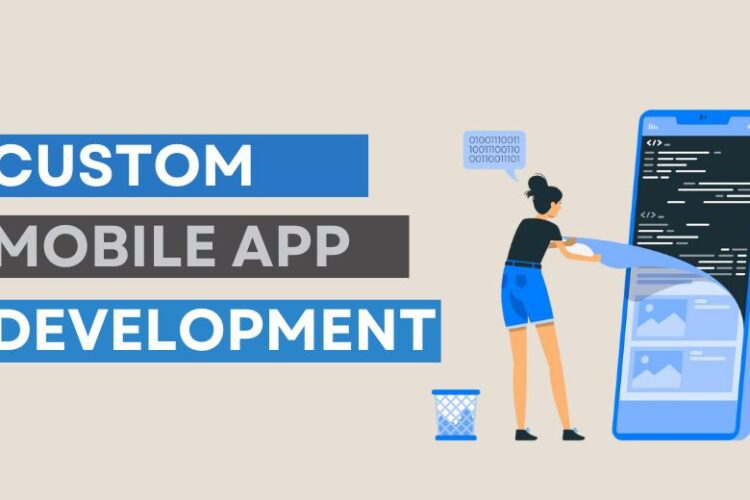It is pretty difficult to win in this fast-paced competitive world of startups without proper technology development. The solutions must be efficient, scalable but at the same time, unique for the specific goals of a startup itself. In such scenarios, off-the-shelf software is rarely appropriate and, by far, cost-effective; however, this hardly aligns with what a particular startup may need. Thus, custom software development for startups comes in.
Custom softwares offers personalized solutions for meeting the individual business requirements and addressing the challenges faced by the company. These provide us solutions for optimizing our processes that will foster growth to our company.
In this blog we are going to discover why the custom software solutions are a revolutionary force to startups and how these can help startups to win the competitive edge.
1. Meeting Business Specific Needs
Usually, start-ups are characterized by innovative ideas or niche offerings, meaning that their requirements are far from those of established businesses or general-use scenarios. The off-the-shelf software developed for a broad audience will include features that startups do not need but lack the critical functionalities that they require.
The designing of a custom solution would enable a start-up to fulfill its requirements. For a logistics company, it might be real-time tracking, but for a health care start-up, it may mean the strongest data security possible. In focusing on what the business needs, startups optimize efficiency and simplify their systems for a better return on investment.
2. Scalability for Future Growth
Custom software development for startups holds the highest benefit of scalability with growth in business. Where exponential growth is being experienced among startups, and technological infrastructure also needs to be aligned according to growth. Pre-packaged software becomes a bottleneck in the sense of scalability or turns out to be an expensive upgrade.

The custom software is developed scalably. Such an upgrade would not disturb the operations of business. This way, for a growing startup in adding more users and adding new processes or features to it, the custom software can continue expanding without disrupting operations.
3. Better Cost Effectiveness
Custom software development for startups is quite an expensive investment, but compared to the long-run cost, it is cheaper than the pre-built software. Normal pre-built software comes with a license fee that recurs every term, and any form of customization or integration is usually extra.
Custom solutions avoid unnecessary costs since it has only those features that are required. Start-ups also save in the long-term maintenance as updates and optimizations are built specifically for their system; hence, no repeated investment in new software is necessary for an evolving business.
4. Competitive Advantage
In today’s overcrowded markets, startups have to outdo each other in order to survive. Custom software helps businesses to establish unique offerings or improve on an existing service, thus being different from others.
For example:
- An e-commerce startup can develop a custom recommendation system tailored to user behavior, increasing engagement and conversions.
- A fitness app start-up can be designed for a unique interface that allows easy tracking of goals, thus raising retention.
That makes innovation even faster, and they give very unique customer experiences that may even outperform the competition.
5. Strong Data Protection and Compliance
Those that involve sensitive data about their customers or handle businesses in extremely regulated fields like healthcare and finance require more consideration over data security. Most applications would lack the appropriate degree of security and compliance necessary, exposing such companies to data breaches or penalties related to regulation.

It may be capable of state-of-the-art security features along with the compliance of industrial compliances through custom software development. The company further strives to include some safe attributes like encryption, multilevel verification, access controls for its safety rather than protecting only data.
6. Integration with Other Systems
Most of the start-ups rely on a host of software applications to run different functions within the company, such as CRM, accounting, and inventory tracking. Most of these applications are not compatible with each other and this would sometimes lead to inefficiencies as well as data silos.
Custom software can be built to integrate with existing systems, creating a seamless workflow. This allows data to flow smoothly between platforms and reduces manual work, allowing for increased productivity. Startups can also customize the software to include APIs for future integrations, keeping their systems adaptable as their needs evolve.
7. Flexibility to Adapt to Market Changes
Startups work in high fluid markets where adaptability becomes a critical factor of survival. Trends and consumer preferences shift overnight, and competitor strategy redefines the playing field, demanding more prompt adaptation.
Off-the-shelf softwares is usually not flexible enough to meet this requirement. This helps provide agility to startups so they can better respond to the needs of their markets.
Whether it is the infusion of new features, optimization of processes, or implementation of user feedback, custom software development for startups empower startups to change quickly and strategically. In addition to this, customized solutions align technology with the unique aims of the startup, ensuring that they can take any opportunity and respond to their challenges as they arise.
This flexibility will keep the relevance of the startups, allow them to improve customer satisfaction, and maintain a lead in their space.
8. Better Customer Experience
The foundation for developing loyalty as well as growth comes via the provision of a premium customer experience. Custom software development for startups specifically designed for their target audience-thus making it user-friendly and engaging.
For example:
- It may offer a food delivery startup app that will include real-time tracking and easy navigation.
- It thus brings the intuitive, user-friendly learning environment to life according to its learner’s requirements.
Focusing on the user experience helps startups to get a close relationship with their customers and thus attain long-term success.
9. Data-Driven Decision Making
Insights in today’s data-driven world are the lifeblood for any startup’s success as it guides proper and informed decision-making. Custom software usually integrates advanced analytics and reporting tools that are customised to the unique goals and challenges of the startup.
These tools allow for access to real-time customer behavior data, insights into the operational performance, and market trends so that a startup could fine-tune its strategy, adjust the workflows so activities are maximized, and allocate the resources more efficiently.
Further, the tool allows forecasting trends so the startup can have a chance at outsmarting emergent challenges before they happen.
10. A Long Term Technological Asset
Custom software would not only be an immediate answer but would also become the future asset and growth of the business. For a startup, what begins with software can definitely become much better, helping stay fresh and effective over time.
With custom software being a development, nothing will ever become outdated or unsupported like commercial packages.
This way, investment in custom software development puts startups on the right track toward long-term success because their technology aligns with their changing needs and goals.
Conclusion:
It’s for startups where innovation, adaptability, and efficiency at scale will be keys to success. Off-the-shelf software may paper over the issues for a little while, but it doesn’t much say how best to address the idiosyncrasies particular to startups.
The type of custom software development for startups is one-stop tailor-made solutions suited especially towards distinctive demands, scaling upwards on greater flexibility, innovation, etc. So this kind of customization helps improve a few aspects related to operational efficiency through some excellent customer experience provided across platforms.
Possibility of investment in custom software is to build a solid foundation for growth and realize the vision into reality with an upper hand in the market. Among all reasons like scalability, security, and competitive differentiation, this can be more beneficial rather than it being costly.
This would indeed make it a significant choice for any forward-thinking startup.
Also read, Unlocking the Power of Cloud Native Application Development for Startups




